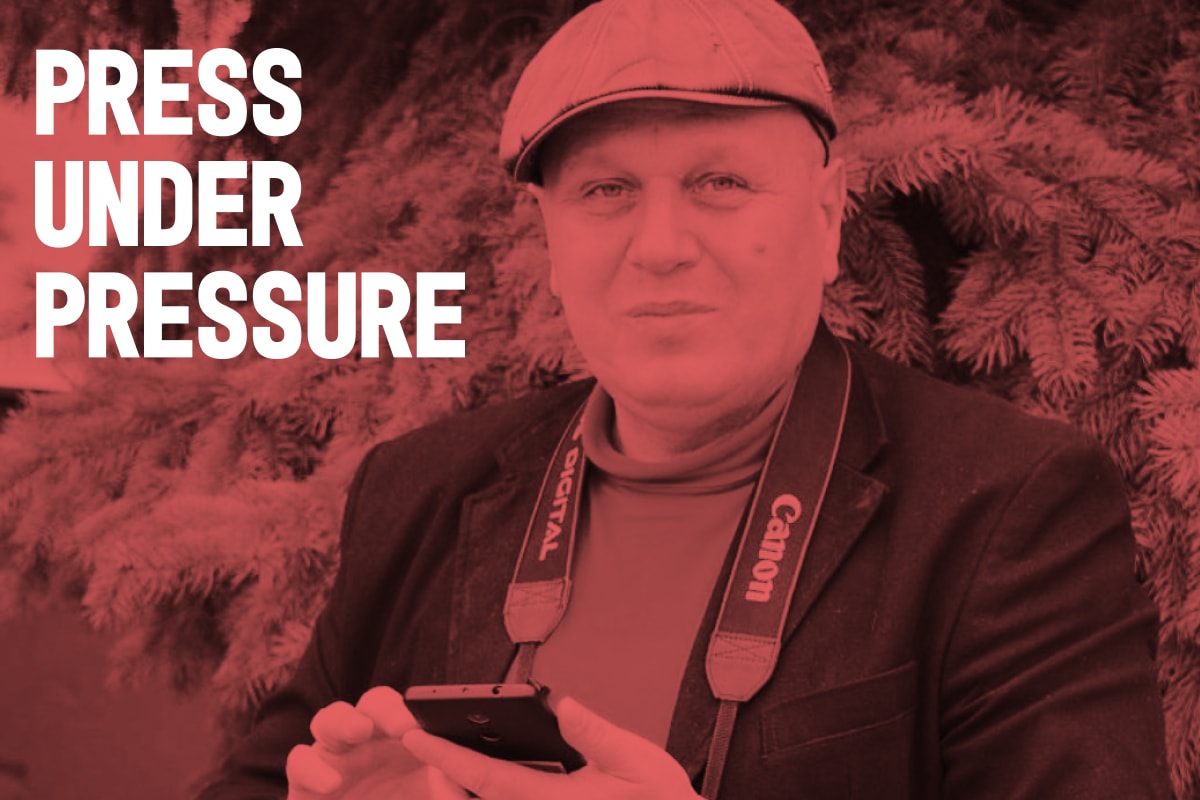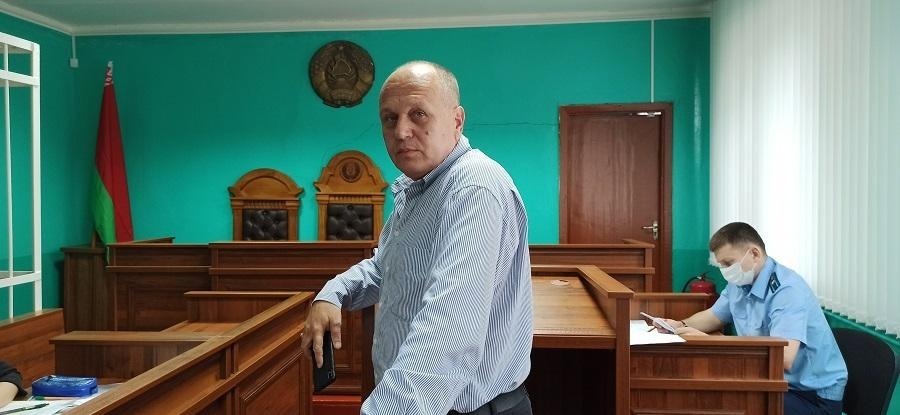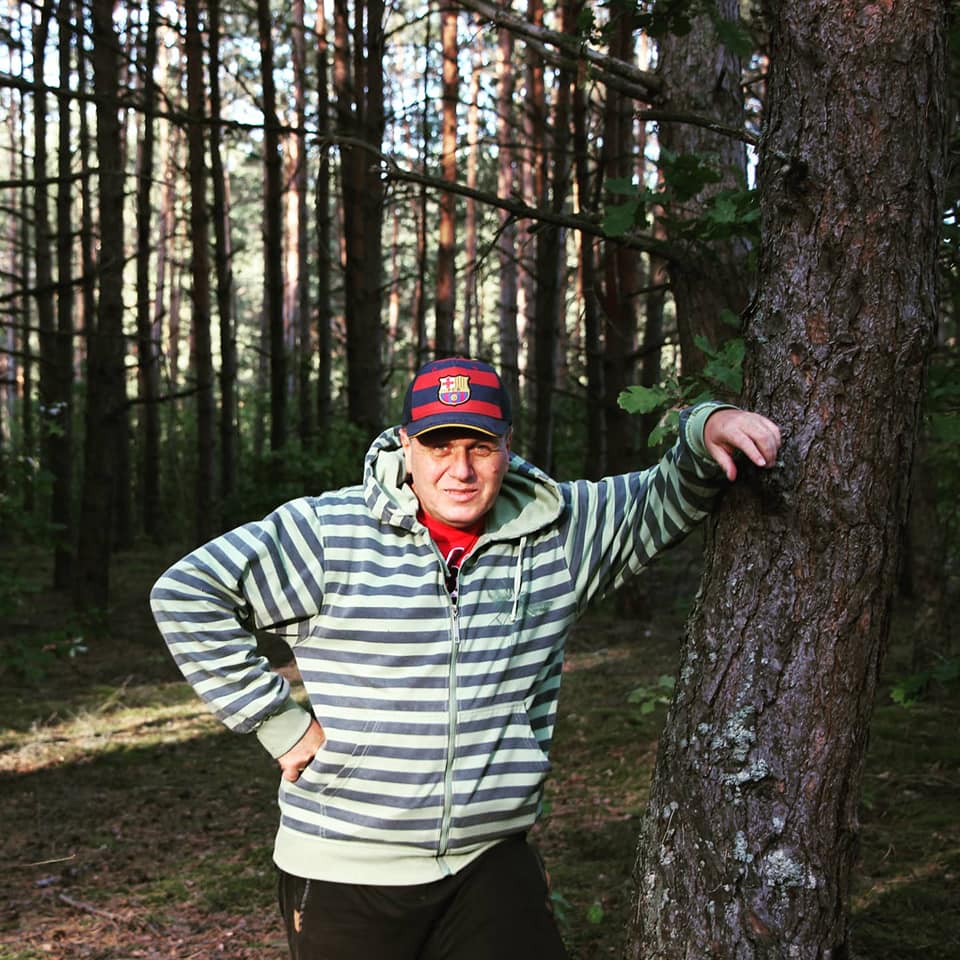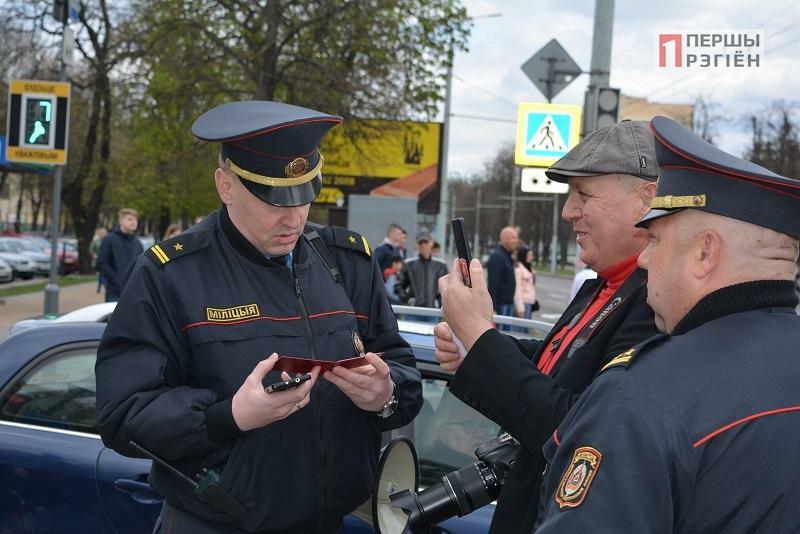
In December 2020, he was detained by riot police officers on his way to Brest. He was accused of libel, contempt of the President and a state officer. According to the investigators, he posted offensive comments in a Viber group which was deleted later.
The reporter has spent several months under home arrest. In August 2021, he was sentenced to 18 months in prison. The journalist did not plead guilty.
‘They [law enforcement agencies] were rather worried about my professional activities than the suspected crimes. <…> It seems that investigators followed the once funny saying, «It’s important to not come to thyself during an investigation». I declare not being involved in these crimes, I am not guilty. The prosecution failed to prove my guilt and is completely based on hearsay, on firm beliefs of the people unaware how to use the Internet,’ said Sergei Gordievich in his final word.
Human rights defenders have recognized the journalist as a political prisoner. His story is hereby told by his colleagues and friends.
On October 27, 2022 Sergei Gordievich was released from penal colony No. 17 in Shklov (Mogilev region). The journalist has completely served his sentence.
On November 14, 2022 the Ministry of Internal Affairs added the journalist to the list of persons involved in extremist activities.

I met Sergei by accident. We were covering local problems, news, we were planning to expand to other districts of the Brest region. Pavel Dajlid, editor of our Piershy Region website, said, ‘There is an interesting person, Sergei Gordievich, he’s not an educated journalist though. He’s active, involved. People respect him, know him.’ So I called him and we met.
In December 2018, we employed Sergei. Since we worked remotely, we didn’t meet in person often, but stayed in touch all the time.
All of his materials rather covered people’s problems than politics: road repairs, issues with utilities, employment disputes. And then there were charity initiatives. Sergei helped a woman from Drahičyn district to raise money for her eye surgery. I remember how happy he was when the money was raised and then when the surgery was successful.
Sergei has great reporter potential, even though he has no professional education. He is a journalist with a good understanding of what people are interested in.
Sergai was good at video polls. This, too, requires talent: approach a person, state a question correctly, for many people are shy, afraid of camera.

Sergei Gordievich
He had authority among the locals, people, including the officials, respected him. It might have been due to his work, but rather because he is an honest and kind person. I have no idea why they thought he was dangerous in a political sense.
I wrote once, ‘Fellows, we must remember one important thing: we work in mass media. A journalist must always remain a journalist. Not an activist. Not a politician. A journalist must be objective and present different points of view without taking sides. Certainly, each and every one has an opinion; that’s what columns are for.’
After that, Sergei often used to say, ‘You taught me. We must remain unbiased and adhere to the rules of journalism. It works when an official sees their words had been presented correctly in a published article, as is, without any side opinions. Then there is room for understanding, then problems are solved.’
So we worked. We helped local residents in solving their problems, even small ones. Say, there is a pile of sand lying on the road somewhere or dangerous holes in the road. People could complain to Sergei, he would write an article, ask for a comment. And then things start moving, problems get solved. If an issue was resolved quickly, we would publish a grateful note to the officials—they made an effort for the people.
Sergei worked for the good of the people, for the prosperity of our country. For when each person tries to solve even minor problems in their area, the changes will be major.

Sergei Gordievich
Sergei was accused under three articles of the Criminal Code. It is very difficult to comprehend. Someone posted a one-word comment in a Viber chat at night which was offensive and referred to the head of state. Sergei said he did not do it, and I believe him. There were several fake profiles under the name Gordievich in that Viber group.
Some conflict in the law enforcement agencies preceded this accusation; it’s hard for me to say what were the grounds for it. Even before the election, they tried to summon Sergei under unknown cases. I saw they were simply distracting the man from his work and I could not understand why, so I sent him on business trips so he could work and avoid detainment.
He was certainly targeted and persecuted. Sergei received different things: letters, slander. With explicit words, pictures. I was shocked with how much hatred people have. What’s going on in their heads? In their hearts? Those people must have black souls.
When Sergei was detained they kept him in custody for too long and, in my opinion, without grounds. I called the prosecutor to ask why a journalist was detained and placed under house arrest. A crime under that article poses no significant danger for society. Yet he was arrested. And three months later, Drahičyn district court confirmed it by releasing Gordievich.
However, two other cases appeared later: offence against some police officers. How exactly did he offend them, that I don’t know. Sergei did not admit his guilt.
I understand it was hard to work under the threat of criminal persecution. Yet Sergei tried to show no worries and kept working. He kept responding to people’s requests and seeking justice. His latest article was finished by our reporters. And some other materials remain unfinished. Sergei said there was missing information on some topics. This might have been what those police officers saw a threat in. One shoulder marked person was mentioned there in connection to dubious deals on estate purchase and discount loans. He’ll finish it when he returns.

Sergei Gordievich
I received one letter from him. He is obviously trying to hold on. He writes it feels like a rough summer camp. He tries to joke, but it is obviously difficult. Sergei is worried, as any person would be when it’s unclear what are the reasons for his persecution and for criminal cases.
In late July Sergei fainted while walking. His health got worse, even though he is a strong, well-built man. All because of the nerves. They took a year and half from his life, even more. He suffered so much stress during that time… It’s neither legal, nor human.
Gordievich is a brave man, he has a strong temper, he won’t give up. I think he will return and keep working as a journalist because he loves it.
We are expecting him. Our whole team respects and loves Sergei. We miss him very, very much.

We met in 2015, I think. Sergei was a rather active resident of Drahičyn. In 2015, when presidential candidate Tatsiana Karatkevich visited the city, Gordievich worked at a collective farm. And so they sent him away that day so that he wouldn’t be in the city.
He came to work with us at Piershy Region, started writing. He wrote just about anything—quickly, with good quality. Should any accident happen, he rushed to the site, photographed it, prepared an article. Thanks to him, we were often the first to publish information.
Sergei is always at the centre of events; he has a very good pool of contacts, everyone in Drahičyn knows him. Once anything happens, people call him, write to him, notify him.
Sergei sacrificed a lot to journalism, even when it affected his personal time: he dropped his chores, cancelled everything and went to work. No matter the work day or the weekend.
He grew professionally very fast. In just a couple of years, he went from short articles about accidents to journalist investigations. Not everyone can show such results.
Sergei prepared a thorough material about a failure settlement which was built in one of the villages in Drahičyn district. Gordievich provided analysis with numbers, he spoke with the chief and with the locals. He showed that the water pumping tower built there was not required. He showed that billions were invested but the settlement was a failure. Sergei couldn’t finish the article because of his detainment in December 2020. He was at the pre-trial detention centre first, then under house arrest and we could not contact him, it was prohibited. So we finished the material and published it without him.
The reason for persecution was probably his truth-telling and activity. He led a consistent discussion on social media, he talked to people, he showed things as they were—he did the normal job of a journalist.
He was on notice, as they say. He spoke about a provocation against him on election day. He said there was a man sent to start a fight with him. It was in Pinsk where we sent him on assignment.
But this whole thing is not only about Sergei. His wife was fired before the election, she worked at a sanitary inspection. According to Sergei, they said to her, ‘If your husband doesn’t settle down…’
Sergei could, but didn’t want to leave Belarus. He doesn’t consider he’s guilty and he wasn’t going to run away from anything or anyone.

Sergei Gordievich and Pavel Dajlid
Sergei turned 50 recently. He is a real quick learner for his age. Such as, he learned to make videos.
He is very curious, he aspires to learn more. He studied at an agricultural academy but he was good at journalism from the start, he worked and collected material with ease. He worked as a whole editorial office in Drahičyn. One needs to have a whole staff of journalists to achieve such high results and such efficiency. I think they envied him in the state-owned media.
Sergei is very friendly, he’s the life and soul of the party. He has an anecdote for any occasion.
In his letters, he writes he got interested in philosophy. Some prison romance, just like in that Soviet legend about the revolutioners in prison: they read and they write books behind bars. So would he, read books as much as he can.
Should he be free now, I’d give him a hug and ask him whether that prison romance exists. I’m sure it doesn’t. Many of my ancestors were imprisoned in Stalin’s times, Khruschov’s times. But this is how Sergei is, he will not give up. He will read, he will continue self-development.
Terms and conditions
Partial or full reprint is permitted subject to following terms of use.
An active direct hyperlink to the original publication is required. The link must be placed in the header of the reprinted material, in the lead or the first paragraph.
Reprints, whether in full or in part, must not make changes to the text, titles, or copyrighted photographs.
When reprinting materials from this page, attribution must be given to the Press Club Belarus “Press under Pressure” project, collecting evidence of repression against independent media and journalists in Belarus.